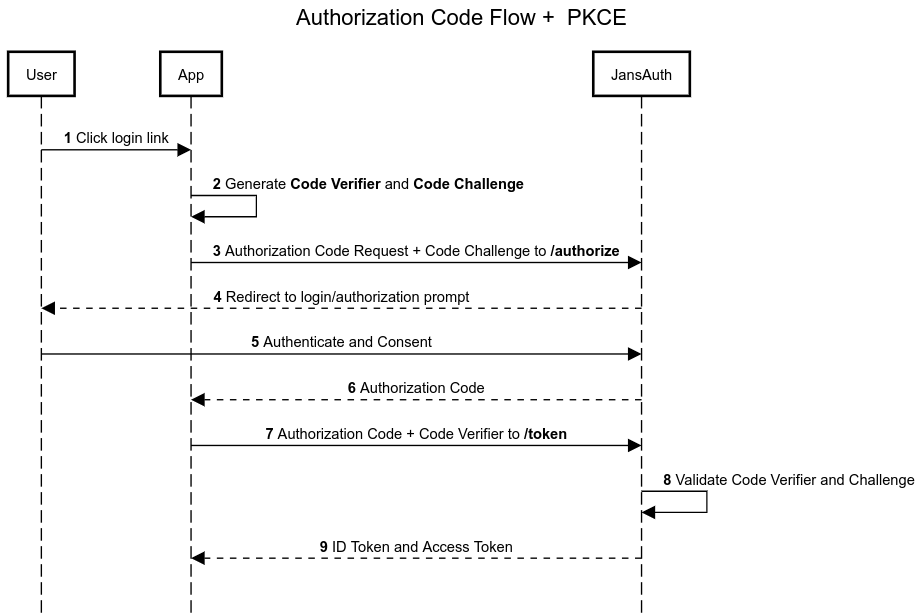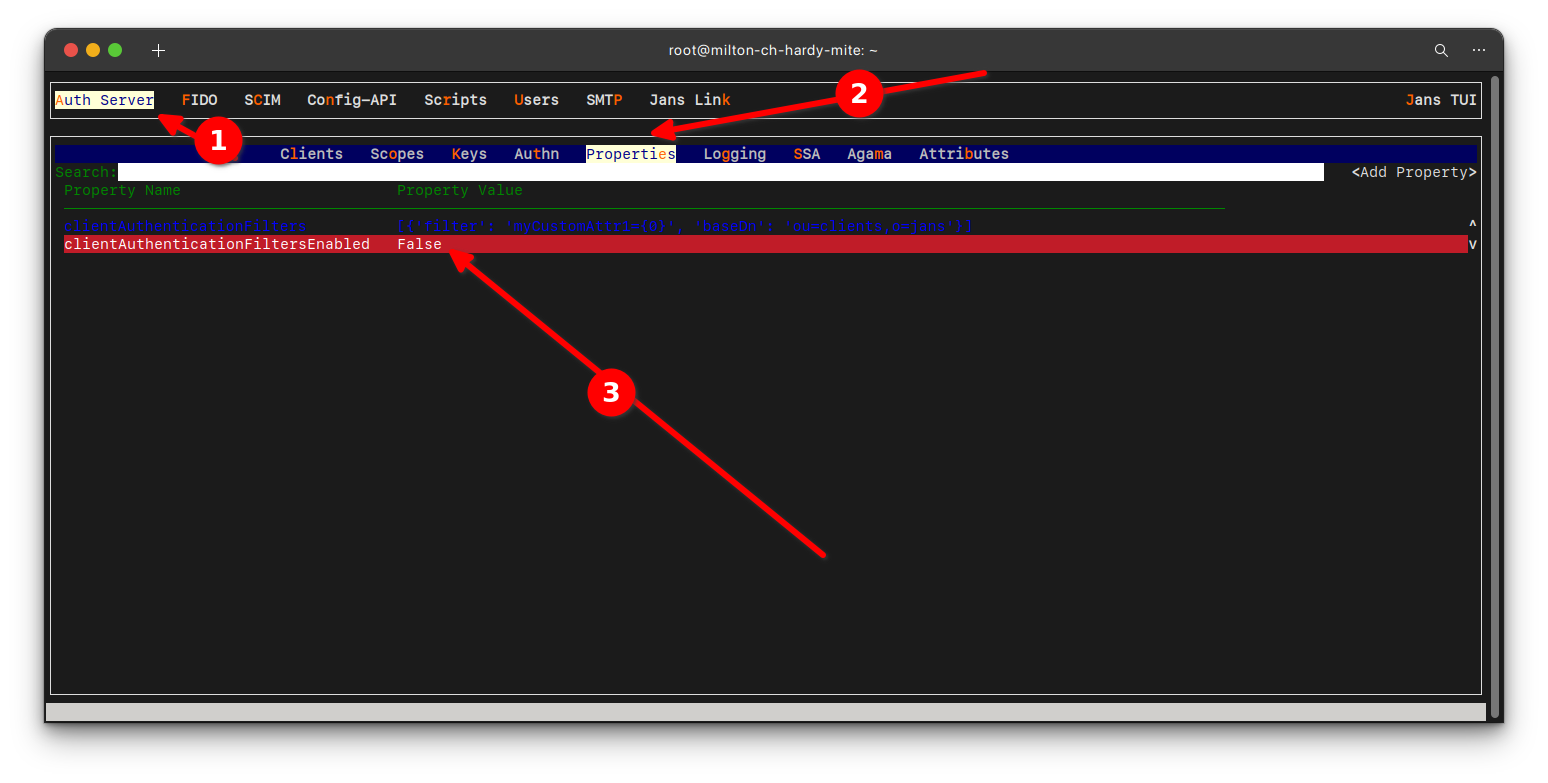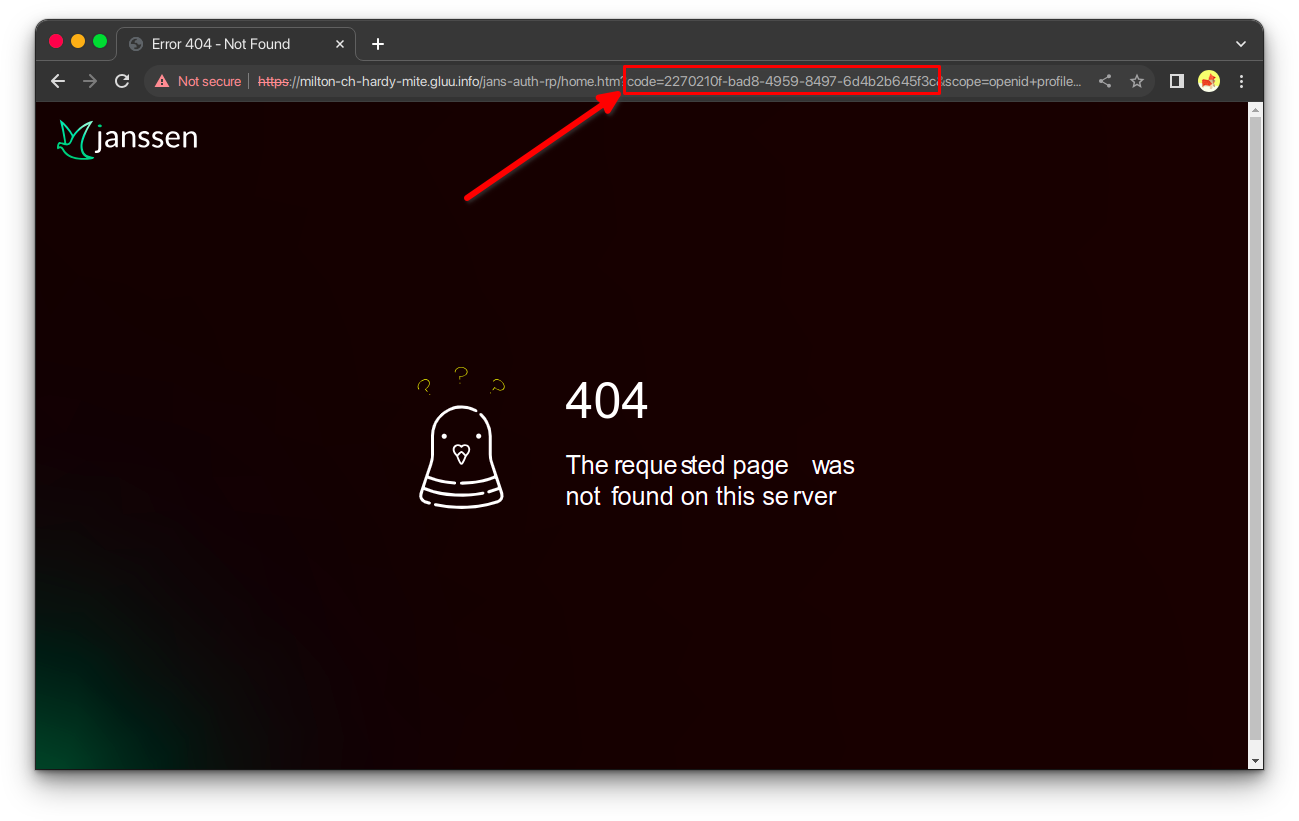PKCE (Proof Key for Code Exchange)#
PKCE(Proof Key for Code Exchange) is an extension to the Authorization on Code
flow to prevent CSRF and authorization code injection attacks. Authorization
code flow with PKCE is defined in this specification.
Public clients (Single Page Apps (SPA) or Mobile Apps), have a serious
problem obtaining access tokens. In the case of SPA you cannot securely store
a secret key, because its source is available in the browser. The same
will happen with Mobile Apps, since decompiling the application will reveal
the secret keys.
This is where PKCE comes in to solve the problem.
The authorization code flow with PKCE is considered as best practice when using Single Page Apps (SPA) or Mobile Apps.
Let's see in the following diagram how it works:

PKCE Configuration#
For this flow to work, we must make the following configuration in Janssen Server.
We need to set the clientAuthenticationFiltersEnabled property to false, it
defaults to true. We can use
TUI to change this
configuration as shown below:

Authorization Code Flow + PKCE#
In this flow, we will execute the following steps:
- Generate Code Verifier and Code Challenge
- Register new client
- Call
authorizeendpoint - Call
tokenendpoint
1. Generate Code Verifier and Code Challenge#
It is necessary to generate these codes for this flow, since this data will be
sent in the authorize and token endpoints.
Code Verifier#
The It is a random string of length N, and is denoted by the field code_verifier.
The following command generates a code_verifier of length 128.
tr -dc 'A-Za-z0-9-._' </dev/urandom | head -c 128; echo
Output example:
root@jans:~# tr -dc 'A-Za-z0-9-._' </dev/urandom | head -c 128; echo
MW54l5Ma7i8n6QsetI_dnJhfMQ6gIfBNJiWFINu6rtD0zvZUXG3STWoolT5HFatjWu2Vj1L-Au4PtRzkear088FJLzq.6tAg10wikJrIqn75HCJ7V1b_p8io_ugkPkkr
Code Challenge#
To generate the code_challenge we need to know what type of method we will be using, so this field is accompanied by
the code_challenge_method field.
Janssen Server supports two methods of code_challenge_method:
plain: When using this method, thecode_challengeis the same as thecode_verifier.s256: When using this method,code_challengemust be encoded using thecode_verifierwith sha256 and * base64Url*.
The following command generates the code_challenge using s256.
Note
To execute command the command below, you need to have openssl, basenc
and tr installed.
echo -n "MW54l5Ma7i8n6QsetI_dnJhfMQ6gIfBNJiWFINu6rtD0zvZUXG3STWoolT5HFatjWu2Vj1L-Au4PtRzkear088FJLzq.6tAg10wikJrIqn75HCJ7V1b_p8io_ugkPkkr" | openssl dgst -binary -sha256 | basenc --base64url | tr -d '='
Output example:
root@jans:~# echo -n "MW54l5Ma7i8n6QsetI_dnJhfMQ6gIfBNJiWFINu6rtD0zvZUXG3STWoolT5HFatjWu2Vj1L-Au4PtRzkear088FJLzq.6tAg10wikJrIqn75HCJ7V1b_p8io_ugkPkkr" | openssl dgst -binary -sha256 | basenc --base64url | tr -d '='
zyI60XbvMetJJuAzyRR_jnxoJkyfxXSqY-mTG4FtBtg
2. Register new client#
POST <YOUR_DOMAIN>/jans-auth/restv1/register HTTP/1.1
Content-Type: application/json
{
"client_name": "PKCE Test Client",
"application_type": "web",
"token_endpoint_auth_method": "none",
"scope": [
"openid",
"profile",
"email"
],
"grant_types": [
"authorization_code"
],
"response_types": [
"code",
"token",
"id_token"
],
"redirect_uris": [
"https://<YOUR_DOMAIN>/jans-auth-rp/home.htm"
]
}
Note
Notee that the token_endpoint_auth_method field is none.
HTTP/1.1 201 Created
Date: Fri, 17 Nov 2023 22:51:13 GMT
Server: Apache/2.4.41 (Ubuntu)
X-Xss-Protection: 1; mode=block
X-Content-Type-Options: nosniff
Strict-Transport-Security: max-age=31536000; includeSubDomains
Expires: Thu, 01 Jan 1970 00:00:00 GMT
Cache-Control: no-store
Content-Type: application/json
Pragma: no-cache
Content-Length: 1541
Set-Cookie: X-Correlation-Id=d92eddf5-ab08-4b4f-a8f1-10af67e83dbd; Secure; HttpOnly;HttpOnly
Connection: close
{
"allow_spontaneous_scopes": false,
"application_type": "web",
"rpt_as_jwt": false,
"registration_client_uri": "https://<YOUR_DOMAIN>/jans-auth/restv1/register?client_id=057c3abf-a1a7-49cc-9e4e-8737e898ac72",
"tls_client_auth_subject_dn": "",
"run_introspection_script_before_jwt_creation": false,
"registration_access_token": "659ccbf9-ac98-437a-b952-33bfc0366fc2",
"client_id": "f48fbdfa-4c07-49e5-938b-10463980e145",
"token_endpoint_auth_method": "none",
"scope": "email openid profile",
"client_secret": "a656a654-c930-4b52-9edb-68ead50d046e",
"client_id_issued_at": 1700261473,
"backchannel_logout_uri": "",
"backchannel_logout_session_required": false,
"client_name": "PKCE Test Client",
"par_lifetime": 600,
"spontaneous_scopes": [],
"id_token_signed_response_alg": "RS256",
"access_token_as_jwt": false,
"grant_types": [
"implicit",
"refresh_token",
"authorization_code"
],
"subject_type": "pairwise",
"additional_token_endpoint_auth_methods": [],
"keep_client_authorization_after_expiration": false,
"require_par": false,
"redirect_uris": [
"https://<YOUR_DOMAIN>/jans-auth-rp/home.htm"
],
"redirect_uris_regex": "",
"additional_audience": [],
"frontchannel_logout_session_required": false,
"client_secret_expires_at": 1700347873,
"access_token_signing_alg": "RS256",
"response_types": [
"code",
"token",
"id_token"
]
}
3. Call authorize endpoint#
From your browser of choice call the following url:
https://<YOUR_DOMAIN>/jans-auth/restv1/authorize?
response_type=code&
client_id=f48fbdfa-4c07-49e5-938b-10463980e145&
scope=openid+profile+email&
redirect_uri=https://<YOUR_DOMAIN>/jans-auth-rp/home.htm&
state=bf1af4a1-8713-49c6-b229-537bf4cf712d&
nonce=f2265e46-6d93-4d36-850b-8fd990cccd04&
code_challenge=<YOUR_CODE_CHALLENGE>&
code_challenge_method=<YOUR_CODE_CHALLENGE_METHOD>
Note
Remember that this endpoint is where you must send the code_challenge and code_challenge_method
parameters.
The field we need to obtain is the code.

4. Call token endpoint#
Previously we have obtained the code field, we will use this value to call the endpoint token.
POST <YOUR_DOMAIN>/jans-auth/restv1/token HTTP/1.1
Content-Type: application/x-www-form-urlencoded
grant_type=authorization_code&
redirect_uri=https://<YOUR_DOMAIN>/jans-auth-rp/home.htm&
client_id=f48fbdfa-4c07-49e5-938b-10463980e145&
code_verifier=<YOUR_CODE_VERIFIER>&
code=<YOUR_CODE>
{
"access_token": "38abc903-9a68-48f9-9ccc-bf1b50fe8152",
"refresh_token": "e945e8ab-19c1-4073-b3c1-913bb090459a",
"id_token": "eyJraWQiOiJjb25uZWN0XzZmZmJkZTQ3LTU5MDgtNDljMy04MGVkLTFjODNhNGEyNWJmOF9zaWdfcnMyNTYiLCJ0eXAiOiJqd3QiLCJhbGciOiJSUzI1NiJ9.eyJhdF9oYXNoIjoiTndiVXg2NlFaUzFvMG1SMmdyRGxKZyIsInN1YiI6IkcxM2ZtQ3RDQkJ0VDN5TzBMWUY0eng3X1ROUktZeGhGNUd6cGFYOUFiZlkiLCJhbXIiOlsiMTAiXSwiaXNzIjoiaHR0cHM6Ly9taWx0b24tY2gtaGFyZHktbWl0ZS5nbHV1LmluZm8iLCJub25jZSI6IjRlOWVhZjdjLWZlMjUtNDlkMC05OGU1LTM2ZTNjYzJhMWNiZCIsInNpZCI6IjIwZThmNTAzLWZmN2EtNGU3OS05OTY3LTUxMTU5NTk1N2JhYiIsImphbnNPcGVuSURDb25uZWN0VmVyc2lvbiI6Im9wZW5pZGNvbm5lY3QtMS4wIiwiYXVkIjoiN2M3OGE0MmUtNTc4YS00OWE2LWExNzAtZTg1N2E0NWYzNTBjIiwicmFuZG9tIjoiZGU0NjE5NDEtNzIzOC00YjZjLWI2NTQtNjg2OTU0MmZlZjc3IiwiYWNyIjoiYmFzaWMiLCJjX2hhc2giOiJ1eFlZWDc5a3c2S2llX0NvaTZERi1RIiwiYXV0aF90aW1lIjoxNzAwMzYxMzA1LCJleHAiOjE3MDAzNjY5MjIsImdyYW50IjoiYXV0aG9yaXphdGlvbl9jb2RlIiwiaWF0IjoxNzAwMzYzMzIyfQ.IRgf6L4HsTHwgIGY_i3Af1dUnS-fLkMz8ND2r6Fgux-W7lkfQYXrpAqyEn-bUZ-L47PhaNWaLIV2bCl8Bxtbk1RhOS0-Sq8YnATkCgsSTCC5gtcZx42N67oQahoInSA4QuySdz1OAChZhlgUHRWn2bnAm07gCf7jfBdqRwCY11GcJrkR4n714tKcr5olxSDok2MJKmkbTi4VPfQXKfTYb7p-mMoqg3cr7w53IrEvQrOM94tYVJs1sUX_HGLwD99d1kRZN8SW2fMUxDsXw4hcDtnL4ktVp1rzc9tseGeu8tWzbNqQHESodOSPYqsl_SaPhuLip2FNFbStqJDc1vjnlg",
"token_type": "Bearer",
"expires_in": 299
}
Created: 2022-07-21